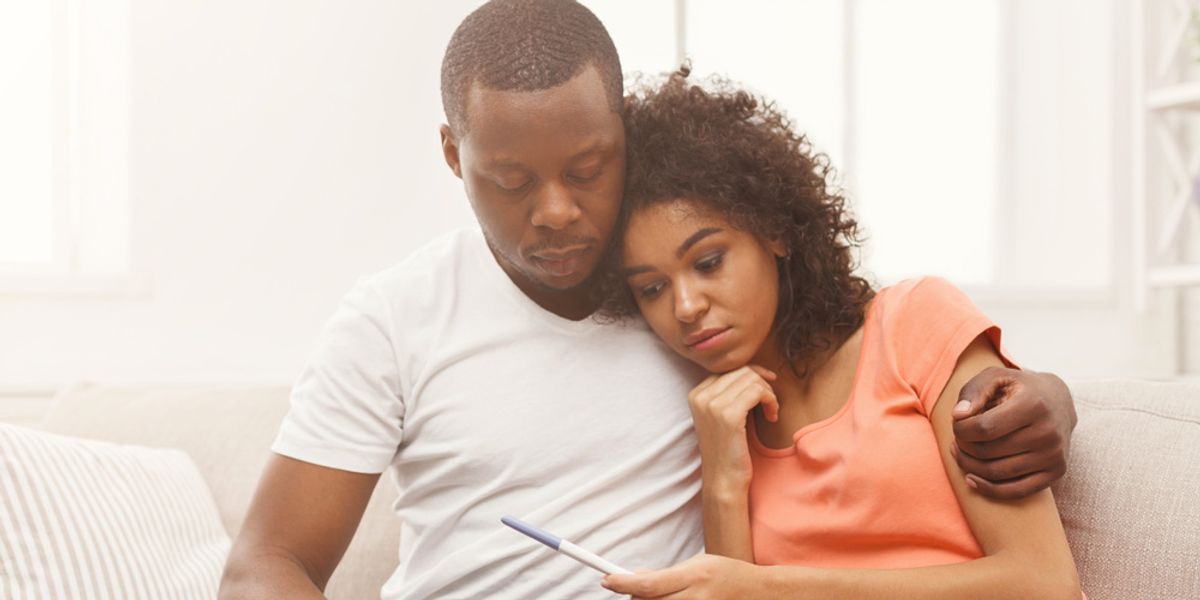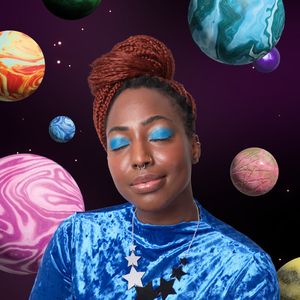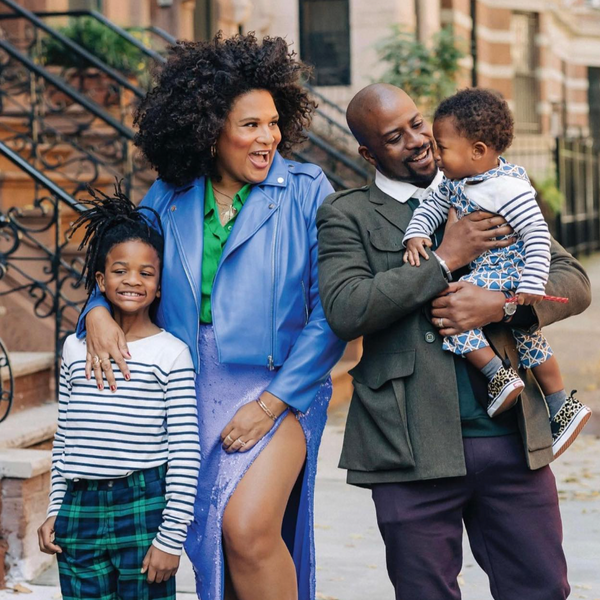
What Not To Say To A Woman Who Has Had A Miscarriage
I remember uncomfortably lying there, silently praying for a miracle.
They were probing around looking for the heartbeat. I looked on the monitor waiting to see some sign of life, anything. I had been to the emergency room a few days prior for spotting, but now it was worse, the spotting turned into cramping and heavy bleeding, which usually is a detrimental warning sign in early pregnancy. These were signs that they told me to look out for on my initial discharge papers. I stopped looking at the monitor because I couldn't take it anymore. When deep down I knew I had lost the baby. The silence and continuous search for a sign of life went on for what seemed like forever…
Finally, the doctor took off the monitor, washed his hands, his face grew solemn as he looked at us and then confirmed that we had lost the baby. At the time, I didn't realize it but he said some of the things that I needed to hear. He sat on the bed and told us that it wasn't our fault. He stated the medical jargon about the statistics but went on to say that it didn't happen because I fell, it didn't happen because we were stressed about money, and it didn't happen if I went out with friends and had drinks prior to finding out that I was pregnant. He just held my hand, passed me tissues, and said that he is sorry and repeated it's not your fault.
I didn't realize how common miscarriages were until I started to experience them. It's a topic that people usually don't speak publically about, but now they are starting to be somewhat normalized (as they should be) with celebrities like Gabrielle Union and more recently Ludacris' wife Eudoxie sharing their experiences going through them. Even men like Lance Gross and Omari Hardwick have come out to discuss the pain of losing a child.
It's really hard to comfort anyone when they experience a loss, but how do you comfort a friend or family member when they feel like they lost it all through a miscarriage? I quickly learned that those ideal comforting words were not so comforting, they were unsettling actually. Here are 4 common words of comfort that you should think twice about saying to someone who has just experienced a miscarriage:
1. "It wasn't meant to be."
Right after our loss, the tension grew in my relationship. We lashed out at one another over the unknown. My boyfriend one day got frustrated with me and told me that God didn't want it to happen and the baby wasn't meant to be.
When those words came out of my then boyfriend's mouth, I honestly didn't know whether to slap him or leave him. It hurt so bad, I thought I was ready to end the relationship. For one, how could he even think that, much less say it? And two, though I do not consider myself to be churchy, I do believe in God and I felt at the time that there was no way that God would want this for anyone. I didn't feel that this was the work of God. My boyfriend expected me to snap out of it and just move on with my life. He wanted his girlfriend back.
You can't tell a woman that has been yearning to have children that the pregnancy wasn't meant to be and expect it to sit well.
Those that desire to be moms yearn to become pregnant and birth babies. Some of us feel that motherhood was what we were put here to do so how dare someone tell us that it wasn't meant to be.
2. "That's normal."
Save the statistics. Please don't play the probability game when someone is going through this. Yes, 1 in 4 women experience a miscarriage. I remember reading that statistic over and over again in the very limited child loss section of the What to Expect When Expecting book as my symptoms started to get worse. Yes, many women go on to have normal pregnancies and healthy babies after their first miscarriage. Hearing these words don't make things better at the moment though.
What many fail to realize is that nothing about a miscarriage feels normal. It actually feels the opposite.
The fact that one day you go into a doctor's office with a life inside of you and on another random day you leave after just finding out that the life that was supposed to be growing inside of you has perished.You leave feeling an unexplainable emptiness. The reason why this is so insensitive is that what we are going through at the time doesn't seem real- it's a nightmare. It's hard to comprehend. Furthermore, we are not just numbers. We are actually people with feelings and it takes time to even try to normalize it especially since no one really talks about what is so "normal."
3. "Try again."
When I decided to share my loss with certain people, they would instantly tell me to try again. This felt like I was being brushed off. This saying is more gratifying to the person saying it because they deem it as an instant solution to the problem. I literally just lost a baby, so trying again was the last thing on my mind. I was mourning this baby. Telling me to try again is like telling me to buy another pet fish. As if the newly conceived baby could replace the one that was lost.
When a woman has a miscarriage, she has the right to grieve that child.
Though she may worry about being able to conceive in the future, please be empathetic to the fact that she did just lose her unborn child and that child cannot be replaced with another one. I am not saying not to later encourage her to try again if that's what she expresses she wants, but be cognizant of the time period. If she just lost a baby, you need to be there for her instead of pushing her to do something that she cannot mentally or physically fathom. Also, be aware of her specific situation, some women have tried numerous times and have experienced repeated miscarriages Some women are told that their chance of conception is unlikely so your definition of trying is not only insensitive it may be unrealistic. Lastly, be mindful that the miscarried mom is grieving what could have been.
4. "The baby's in a better place."
This one baffles me and maybe it's a bit selfish, but what better place is there to be for a baby than with its mother in her loving arms? This saying is hurtful period and I admit after having my first miscarriage, I stopped saying this to people that experienced any loss cause I realized how insensitive it can be. If you want to get biblical, you can let the person know that you are praying for them and really pray for them as opposed to just saying it cause it sounds nice.
Pray for their healing, pray for their well-being, and pray that their prayers are answered.
Coming from a woman who has experienced miscarriages, I've learned the best thing that you can do is tell someone that you are sorry for them, be compassionate and listen to them, give them as much time as they need to grieve and try to be there for them. Other helpful advice that was given to me during this difficult time was to remember that the dad is hurting too and to try not to ostracize him during this difficult time.
Most importantly, for my miscarried mamas, don't let others tell you how you should feel or move forward, you do what you feel you have to do to heal.
And for everyone else, save those common phrases and speak compassionately from the heart.
Featured image by Shutterstock
- Things Not to Say to Someone Who Has Miscarried | Baby Chick ›
- Things Never to Say to a Woman Who's Had a Miscarriage - What ... ›
- What Not To Say After Miscarriage ›
- What Not to Say When Someone Has a Miscarriage - Mom Needs ... ›
- What You Shouldn't Say To Someone Who's Had A Miscarriage ... ›
- 10 Things You Should Never Say to a Woman Who's Had a ... ›
- Things Not to Say to Someone After a Miscarriage ›
- 8 Things NOT to Say to Someone Who's Had a Miscarriage | Parents ›
- Helping Someone After a Miscarriage – Miscarriage Support NZ ›
- What To Say (or Not) to Someone Who Has Had a Miscarriage ... ›
ItGirl 100 Honors Black Women Who Create Culture & Put On For Their Cities
As they say, create the change you want to see in this world, besties. That’s why xoNecole linked up with Hyundai for the inaugural ItGirl 100 List, a celebration of 100 Genzennial women who aren’t afraid to pull up their own seats to the table. Across regions and industries, these women embody the essence of discovering self-value through purpose, honey! They're fierce, they’re ultra-creative, and we know they make their cities proud.
VIEW THE FULL ITGIRL 100 LIST HERE.
Don’t forget to also check out the ItGirl Directory, featuring 50 Black-woman-owned marketing and branding agencies, photographers and videographers, publicists, and more.
THE ITGIRL MEMO

I. An ItGirl puts on for her city and masters her self-worth through purpose.
II. An ItGirl celebrates all the things that make her unique.
III. An ItGirl empowers others to become the best versions of themselves.
IV. An ItGirl leads by example, inspiring others through her actions and integrity.
V. An ItGirl paves the way for authenticity and diversity in all aspects of life.
VI. An ItGirl uses the power of her voice to advocate for positive change in the world.
Let’s make things inbox official! Sign up for the xoNecole newsletter for daily love, wellness, career, and exclusive content delivered straight to your inbox.
Rihanna Talks Shedding Expectations And Finding Balance As A Mother
Since becoming a mother in 2022, Rihanna has defined parenthood by her terms and hopes to pass that sense of autonomy on to her children.
For Vogue China’s April cover story, Rihanna shared her perspective on raising her two sons with A$AP Rocky, and how she hopes to preserve her children’s uniqueness, devoid of societal expectations.
"The most beautiful thing...is that [children] come into the world with their own individuality and sincerity, without any logic or conformity,” she told the publication. “Which usually makes you feel that you must fit into a certain group."
The “Work” artist, known for her trendsetting style and captivating persona, expressed her desire to support children in fully embracing their individuality and encouraging them to be whoever they want to be. "It's really beautiful to see and I want to continue to help them navigate that and make sure that they know they can be whoever they want to be,” she says.
She continues, “They should embrace it completely, because it's beautiful, and it's unique. I love them just that way."
From shattering music charts to shaking up the beauty industry, Rihanna has forged a path that has since created the “dream” life we see today. One that she says has made her parents proud of.
“I’m living my dream,” she continued. “My parents were very proud of that because they just wanted me to be happy and successful. So, I think the key thing is to find some kind of balance. Yes, balance is important. Do this and you get the best of both worlds. You can write your own life the way you want, and it will be beautiful. Sometimes, you just need to let go of everyone’s expectations and start living your own story.”
Rihanna, who shares sons, RZA, 23 months, and Riot, 8 months, with rapper A$AP Rocky, recently shared her vision for expanding her family in the future in Interview Magazine.
When stylist Mel Ottenberg asked about the number of additional children she hoped to have, Rihanna replied, "As many as God wants me to have.”
"I don't know what God wants, but I would go for more than two. I would try for my girl,” she adds. “But of course, if it's another boy, it's another boy."
Featured image by Neil MockfordWireImage














